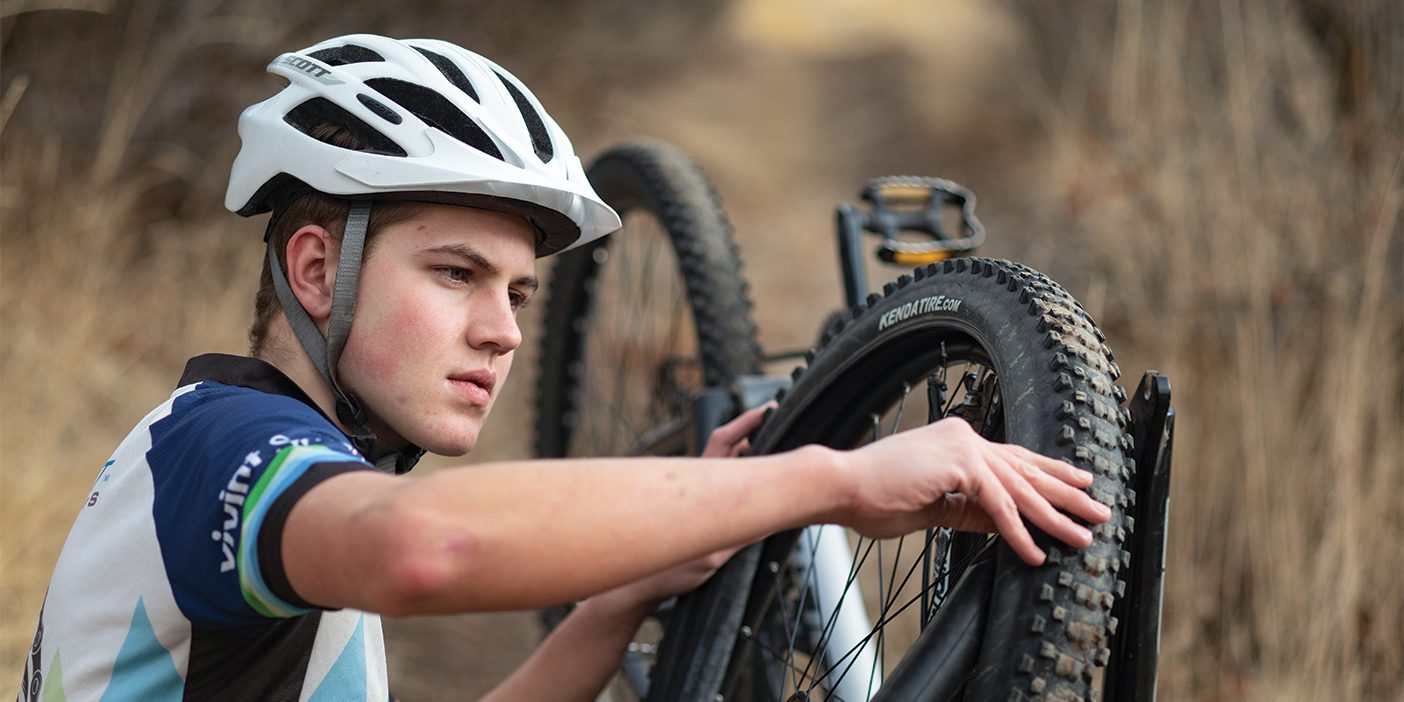Win or lose, young athletes can score life skills.

During Luke Pierce’s first competitive bike race at age 15, he fell on the first lap. Startled, he nevertheless got up and dusted himself off, climbed back on his bike, and finished the race. During his second race, he got a flat tire. He was able to fix it quickly and finished the race—second to last. Luke’s mom, Shelley Brimhall Pierce (BS ’99), says Luke was reluctant to participate in a third race but rode anyway and finished incident free.
“I was super proud of him—that during difficult and fast-paced moments, he was able to make a plan, recover the best he could, and keep going,” says Pierce.
She and her husband, Jason L. Pierce (BS ’99, MBA ’03), have encouraged all four of their children (Luke, now 16; 12-year-old twins Izzy and MJ; and 7-year-old Melissa) to join in many kinds of sports, feeling intuitively that sports will help their children flourish. A recent study by BYU researchers confirms their instincts.
According to study coauthors Paul Caldarella and Jason E. Johnson (BS ’04, EdS ’15), sports participation fosters resilience in high schoolers in a variety of significant ways. “It helps them develop mental toughness and determination not to give up when faced with adversity, build positive values and habits, improve mood and emotions, and foster peer relationships,” says Caldarella, a professor in the Department of Counseling Psychology and Special Education.
He and his colleagues say parents should understand how playing sports builds resilience, encourage their children to participate in sports, and be aware of and minimize any downsides.
“It helps them develop mental toughness and determination not to give up when faced with adversity, build positive values and habits, improve mood and emotions, and foster peer relationships.” —Paul Caldarella
Building Resilience
The researchers define resilience as “the ability to positively overcome or recover from adversity or stress.” Traits that indicate resilience include self-regulation, empathy, and social competence. According to the study, playing sports contributes to all three. In a survey of 276 parents of high schoolers, the researchers found that parents described the 214 students who participated in sports as higher in resilience traits than the 62 students who did not participate.
Coauthor Jared S. Warren (BS ’96), an associate professor of psychology, says that teens who are part of a team learn to power through tough experiences like losing, getting injured, and being booed. Being one of a group that depends on one another can teach teens how to cooperate and to value their ability to help others succeed.
If their team loses, teens can learn how to be good losers. If their team wins, they can learn how not to gloat. “Some parents try to shield their children from challenge and disappointment, and this is often counterproductive,” Warren says. “Resilience is built by working through challenges.”
Another coauthor, Melissa Conklin Heath (BS ’75) of the Department of Counseling Psychology and Special Education, recalls that her daughter gained belonging and life skills from joining her high school swim team. “Swimming engaged her with a good group of friends, and she was much happier. . . . Also, the coach was a great source of inspiration by encouraging healthy eating and a healthy lifestyle,” she says.
When Heath herself was in high school, she found that participating in track challenged and stretched her in ways that built resilience. The team was very small, and team members were sometimes asked to fill in for competition events they didn’t have experience with. Heath was asked to fill in on discus throwing, and she gave it a try. “It felt good to practice and get better week by week. This gave me confidence to try harder in other challenges that were initially difficult,” she recalls.
Interestingly, the study found that adolescents who participated in recreational sports had significantly higher social competence and empathy scores than those who played competitive high school sports. The researchers say that the stronger benefits probably result from a lower emphasis on winning and the freedom of choosing when to participate or not participate.
How to Encourage Sports Participation
Not every child is interested in sports, but some can become interested if they’re willing to try a sport and then have a good experience. Shelley and Jason Pierce’s youngest child, 7-year-old Melissa, saw her older sisters playing competitive soccer and wanted to be like them, so the Pierces signed her up. When it came to actually playing, though, she mostly refuses.
“Sometimes we’ve gone to one of her games and just cheered for the team while she sits there next to us with a sour face,” says Shelley. “Bribing her to play has worked a few times, and while bribing isn’t my favorite pastime, in the end I see it as a win-win because it gets her to play. When she plays, it’s another chance for her to learn and grow, and hopefully she’ll eventually recognize it’s not so bad.”
The Pierces’ gentle wooing of their daughter is a good strategy, and Caldarella cautions parents not to force a child into sports. “The important thing is finding something positively engaging and supporting children’s participation in those activities. While not a focus of our study, there may be similar results from student participation in non-sports activities such as music, art, dance, drama, student government, etc.,” he says.
The Pierces encourage their children to choose their own sports, and they’ve chosen many so far. Luke has competed on his high school mountain biking team and on city league teams in basketball, soccer, baseball, and tennis. The twin girls have played on city and state soccer teams and T-ball teams. All the children have taken tennis lessons, and the whole family skis and plays pickleball. This variety of sports and sports settings could be especially effective in building resilience, say the researchers, who found that the higher the number of sports played by students, the higher parents reported their children’s resilience.
Overcoming Parental Fears
Sports carry risks, both physical and emotional, that might make some parents hesitate to encourage their children to participate. The researchers note that some parents in their survey reported their children experienced physical injuries, increased stress during the sports season, and negative emotions from not making a team.
Warren recommends that parents express support through these challenges and encourage their children to talk. “Parents can help youth leverage available social support, emphasize a growth mind-set, use active coping strategies, and emphasize effort over outcomes,” he says.
Shelley Pierce says having her children participate in sports is always a “gamble” because “you just never know if your kid will shine or [not].” Parents also take a chance with coaches and teammates and whether their money will be well spent or not, she says. Her biggest fear was that her children would play poorly and then think less of themselves or even feel worthless.
“Not one time did that come to pass,” she says. “They may not have enjoyed every minute of participating, but they did have fun and learned something. At the end of the day, when every single one of my children has played in a sport, he or she learned something and so did I as a parent,” says Pierce.
Helping Teens Navigate
The researchers hope the findings of their study will help parents look at sports as more than just a way to help their teens become competitive in their future careers or other pursuits. Sports can help teens also learn skills that lower their susceptibility to typical adolescent challenges like alcohol or drug use, physical fights, bullying, and anxiety or depression.
Warren believes it’s not possible to build resilience in the absence of challenge or adversity: “One of the great things about sports participation is that it provides real-world exposure to many challenges that are a normal part of life. As they go through tough experiences, teens gain resilience that makes their lives better not only during adolescence but throughout their lives.”
Dos and Don’ts
The professors offer the following advice to parents as they encourage their children to play sports:
• Let your children choose from a wide variety of options.
• Encourage your children to stick with a commitment to a team, but give them the choice to stop after fulfilling that commitment.
• Talk with your children about what they are learning and what they enjoy or don’t enjoy.
• Don’t coerce or compel children to participate in sports. If they’re not interested, help them find other options for learning resilience, such as music, art, or acting lessons.
• Don’t minimize the impact of children not being chosen for a team, losing, or experiencing other tough consequences of sports participation. Help your children work through their feelings.
Sue Bergin is a writer and Marriott School adjunct instructor.












